Kansas City arts organizations defied odds in 2020 and pulled off some of the most remarkable performances in recent memory. They ranged from a handful of live-with-audience performances (some pre-pandemic, some during) to a bevy of virtual shows and one “special event.”
Classical KC; 91.9 Goes Live; After 20 years without a dedicated FM station, classical fans were delighted when Classical KC (91.9-FM) began broadcasting around the clock: with local content, syndicated shows, and a promise to expand coverage of Kansas City events. There’s even a large dose (gasp!) of contemporary music! The key to making this work, as Director Stephen Steigman explained, was to abandon the commercial model and create a non-profit entity under the auspices of the Curators of the University of Missouri. It’s one of the most interesting FM stations in the country.
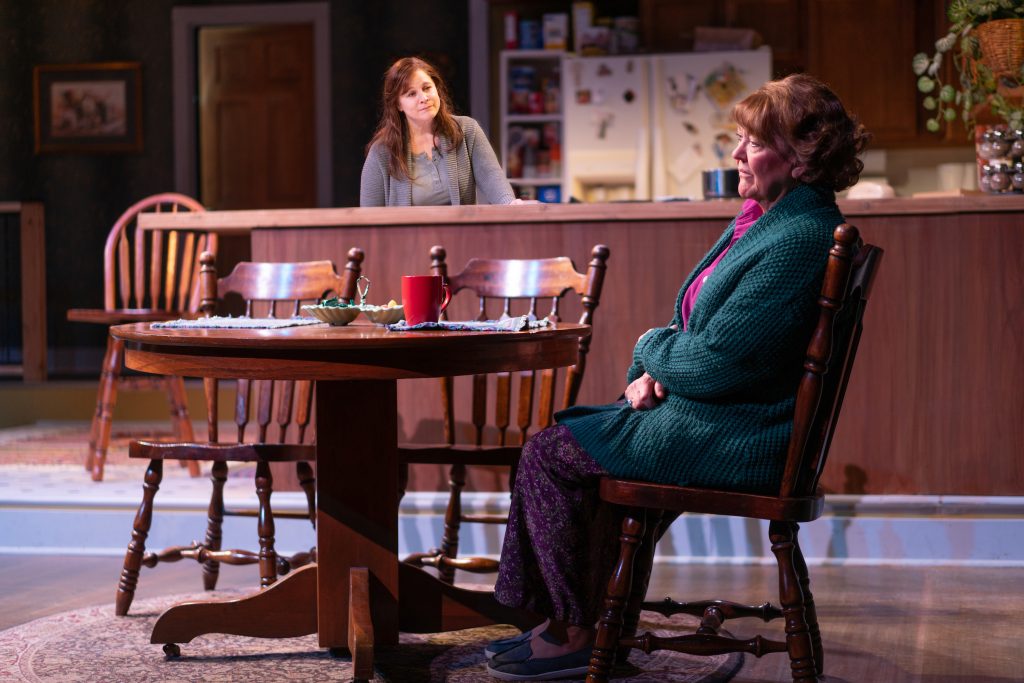
Cinnamon Schultz and Jan Rogge performed in Kansas City Actors Theatre’s production of Marsha Norman’s ‘night Mother. / Photo by Brian Paulette
Kansas City Actors Theatre; ‘night Mother; Marsha Norman’s Pulitzer Prize-winning two-woman play is one of the most emotionally wrenching works of 20th-century American theater. A daughter announces to her mother that she is going to commit suicide, and the mother moves from whimsy and denial into guilt and horror. I can truthfully say that Actors Theater’s production was every bit as powerful as the original Broadway run (which I’m actually old enough to have seen back in 1983). Cinnamon Schultz was the flat-voiced daughter who made careful preparations for her demise. Jan Rogge was so devastatingly convincing as the mother that I felt I was watching a scene from my own life: Hers was one of the most powerful performances I’ve seen on a Kansas City stage. Sidonie Garrett directed with stealth, and the production designs were top-drawer.
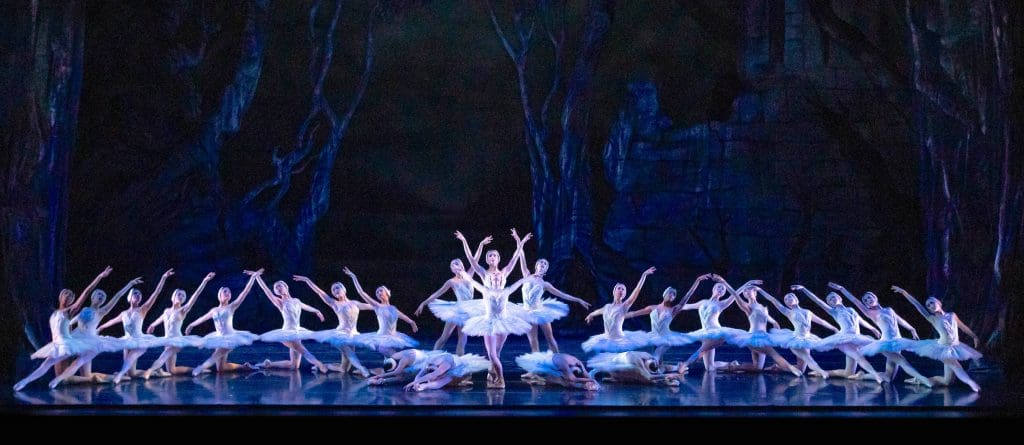
Kansas City Ballet’s corps de ballet is as large as it has ever been. / Photo by Brett Pruitt and East Market Studios
Kansas City Ballet; Swan Lake; The Ballet barely squeezed in its winter run before the shutdown, and it was one of the most impressive performances the company has rendered. Devon Carney’s choreography, first introduced in 2016 and drawing upon the Petipa original, is possibly the best work he has done in Kansas City, and the company is now substantial enough to bring off a work of this scale. The newly refurbished version featuring sets from Ballet West were even more imposing than those used in 2016. The company looked uniformly in command, with polished lead dancers and an ever-improving, if youthful, corps.

Members of the Kansas City Repertory’s Summer Youth Theatre Ensemble both wrote and performed in ‘Disconnected,’ a story about tolerance and self-acceptance. / Photo courtesy of Kansas City Repertory Theatre
Kansas City Repertory Theatre / Summer Youth Theatre Ensemble 2020; Disconnected; Few of the local “Zoom-theater” productions in 2020 were as engaging as that written and performed by the young artists of The Rep’s summer program. In this virtual play, 13 teens surfing the web become trapped in a Zoom call, or as one states it, “stuck in a weird magic-link-virus-thing.” Through monologues we learn of the struggles each is facing: with racism, bullying, homophobia, family, gender orientation. The only way to get out of Zoom hell, they discover, is to come to terms not just with their own problems but with those of their peers. Laser-focused and wittily entertaining, it is the brainchild of The Rep’s Virtually Yours Team, led by Education Director Melinda McCrary, Teaching Artists Yetunde-Felix Ukwu and Andy Perkins, Video Designer Khalif J. Gillett, and others. The link is still accessible on The Rep’s YouTube channel.
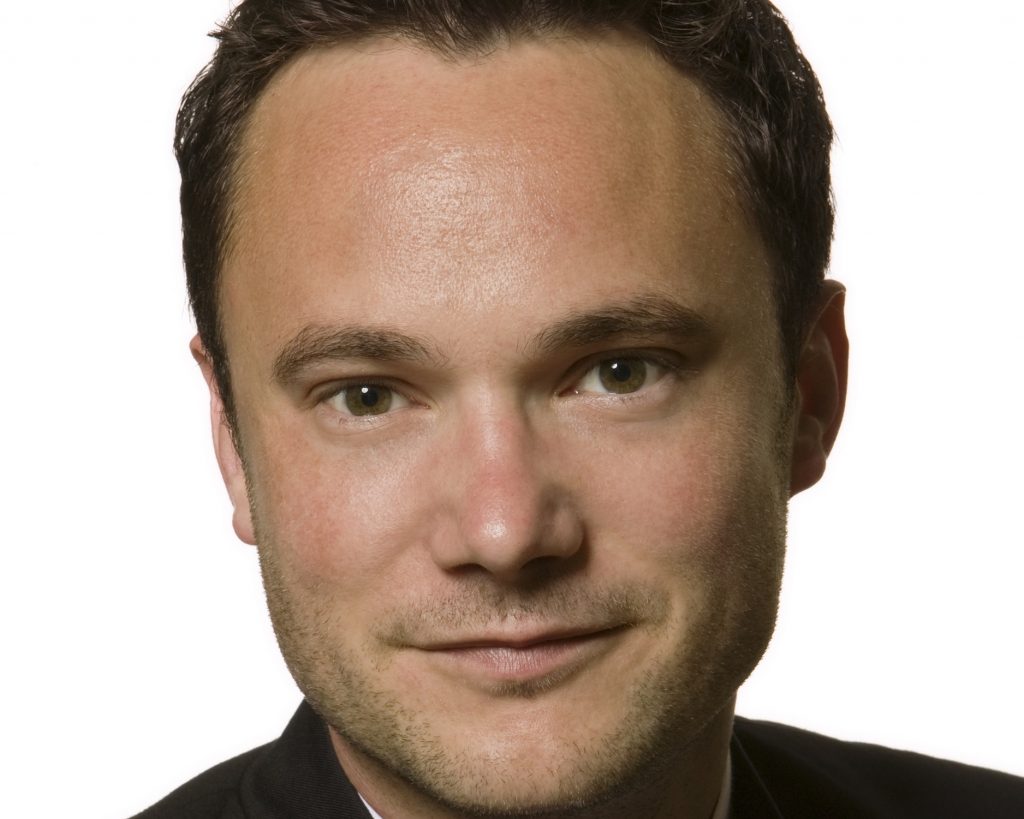
Matthew Halls, guest conductor, led one of the Kansas City Symphony’s contributions to the Beethoven 250th birthday celebration, a performance of the composer’s Mass in C. / Photo by Eric Richmond
Kansas City Symphony; Beethoven Mass in C; Guest Conductor Matthew Halls is known as an 18th-century specialist, and his version of Haydn’s Symphony No. 102 was exceptionally tender and smart. Just as impressive was the emotionally charged Sinfonietta by James MacMillan (b. 1959), and the sophisticated rendering of Beethoven’s Mass in C. Often performed as a slight little thing, here the Mass loomed as a masterpiece. The Symphony Chorus sounded rigorous and well-sculpted, and Matthew was boldly in his element, as he led one of Kansas City Symphony’s contributions to the Beethoven 250th birthday celebration.
Midwest Trust Center; New Dance Partners: Virtual Retrospective; This annual presentation (by the organization formerly known as the Carlsen Center) of new dance went electronic, with works by four choreographers performed by four companies. Michaela Taylor’s bts placed dancers from Wylliams/Henry Contemporary Dance Company directly on the Midwest Trust Center stage, with compelling videography that reminded us that “filmed dance” is a distinct art form. Caili Quan’s Keeping Time featured six dancers of the Owen/Cox Dance Group placed in multiple venues and cities. Störling Dance Theater’s Maria by Rosie Herrera formed a sort of religious narrative, and Julia Hinojosa’s Tal como eres for Ensemble Ibérica highlighted flamenco dancer Melinda Hedgecorth. The tech team (including Sean Bergman and Alec Nicholas) were essential in bringing this all together.
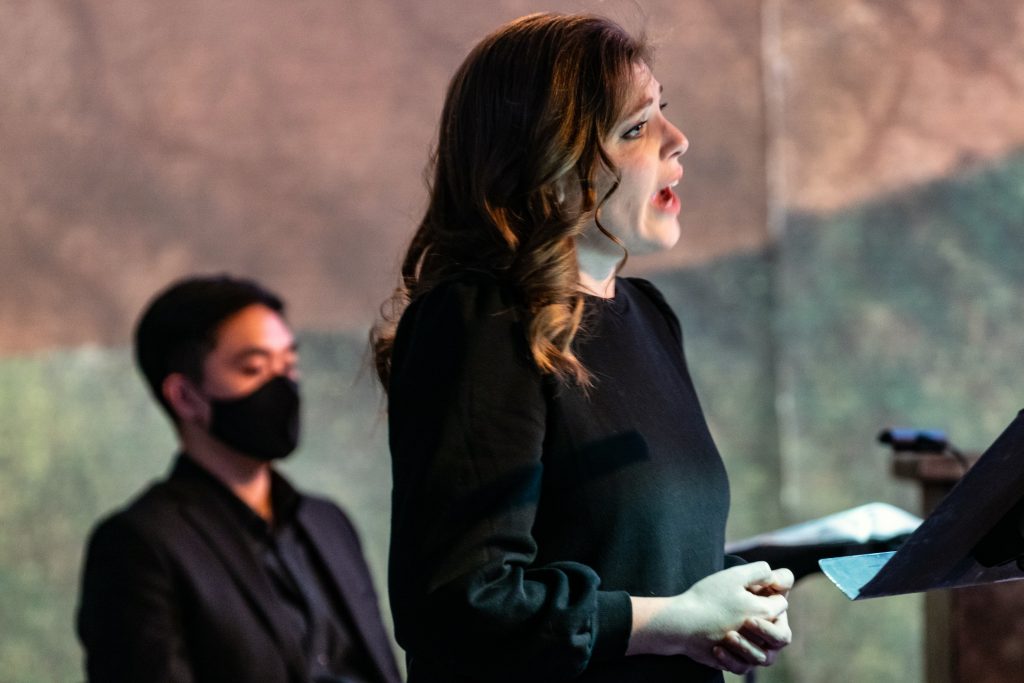
Mezzo-soprano Kelly Morel sang the part of Amahl’s Mother with strength and tenderness, as part of the Lyric Opera’s fine cast of Kansas City-based singers. / Photo by Don Ipock
Lyric Opera of Kansas City and Paul Mesner: Amahl and the Night Visitors; Mesner’s past experience with opera has demonstrated that the centuries-old tradition of puppet opera still holds validity. With singers restricted from performing onstage, the Lyric Opera ingeniously devised a version of Amahlin which puppets could “act” while musicians performed safely from the sidelines. Director Shawna Lucey’s previous experience with puppetry was on full display. (She had also directed the Lyric’s remarkable Lucia di Lammermoor in early March, with Sarah Coburn as Lucia, which COVID-19 closed after a single performance.) Mesner’s puppetry was remarkable, and Kelly Morel sang the Mother with such pathos and warmth that it helped hold together the production’s disparate elements.
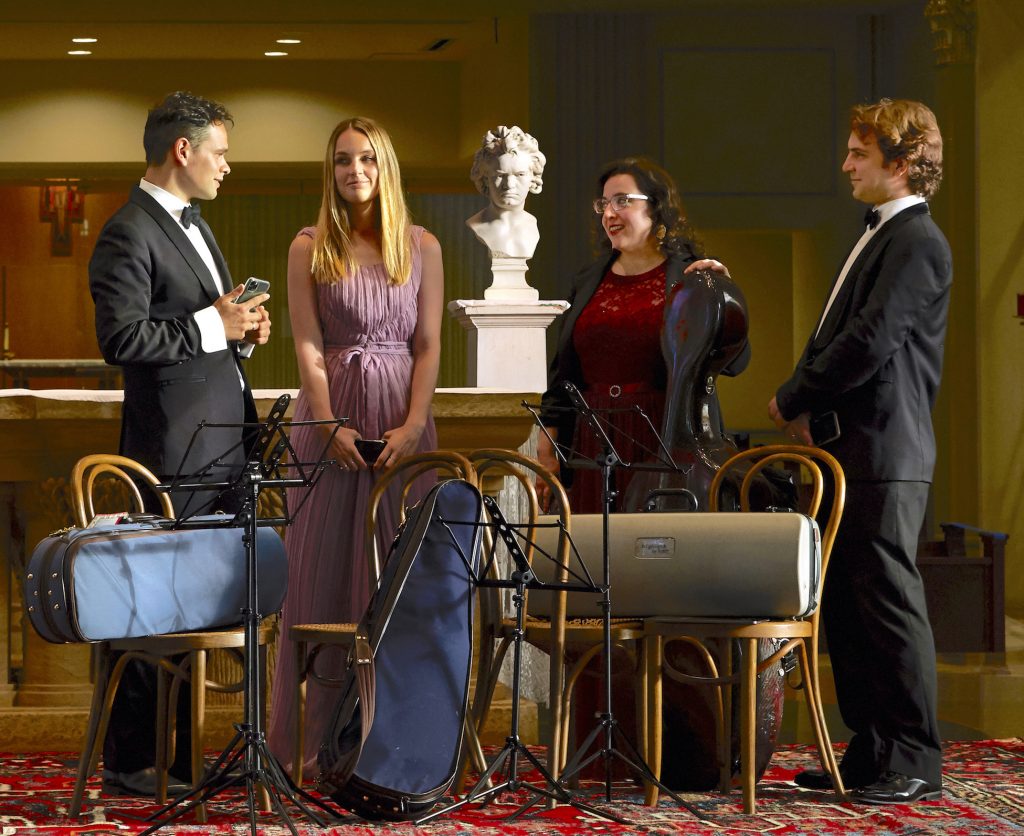
Violinist Keith Stanfield, Violist Ashley Stanfield, Cellist Sascha Groshang, and Violinist Zsolt Eder, all with the Opus 76 Quartet, prepared for their performances of Beethoven’s complete string quartets. / Photo by Gary Rohman
Opus 76 Quartet: The Beethoven String Quartets; Members of the Kansas City-based quartet spent hundreds of hours preparing for Beethoven’s 250th birthday, and they were determined to make it work. During six Saturdays, 40 lucky and well-distanced fans heard 14 hours of music in the wildly resonant acoustic of the Cathedral of the Immaculate Conception. Admirable in every way, this was probably the only live Beethoven cycle performed in the United States last year: no small achievement! A beautifully recorded set of CDs of the cycle is available at opus76.org.
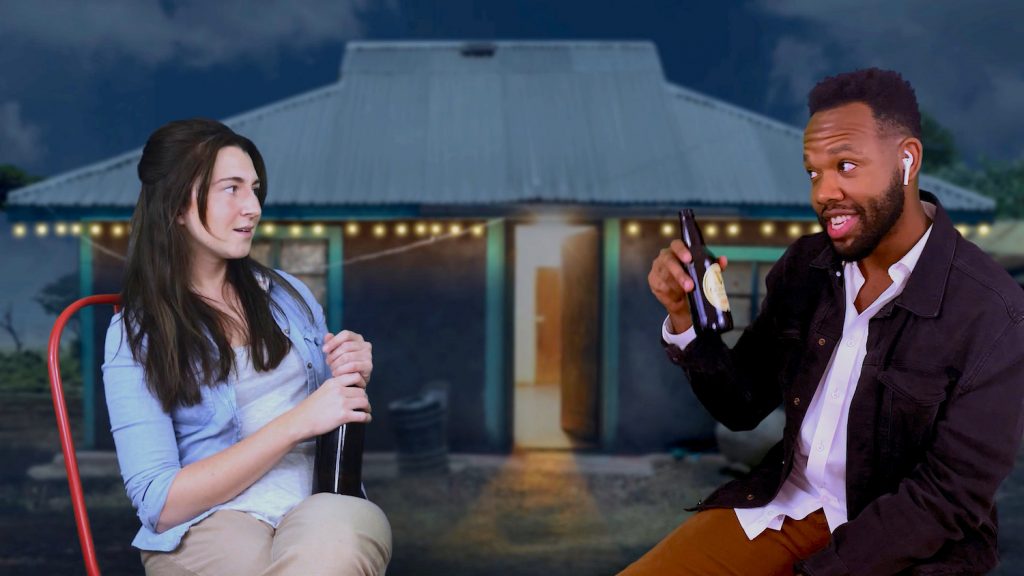
Elise Marie Poehling and Teddy Trice performed from different cities in the Unicorn Theatre’s virtual production of Will Snider’s play Death of a Driver. / Photo by Cynthia Levin
Unicorn Theatre: Death of a Driver; Theater by its nature requires a certain suspension of belief, so the idea of integrating geographically separated actors digitally, against a greenscreen no less, should not be much of a stretch. Yet there was something oddly fantastical about the Unicorn’s production of Will Snider’s 2019 play, directed by Ian R. Crawford with videography by Conor Tierney. Elise Marie Poehling’s character has come to Kenya to help build a road, out of a spirit of misplaced altruism, and she forms a touch-and-go bond with her driver, played by Teddy Trice with authority. Behind them flows a series of virtual landscapes and interiors. The interaction between the two actors, who were in different cities, was almost seamless: In fact, the technology itself grabbed much of the limelight.
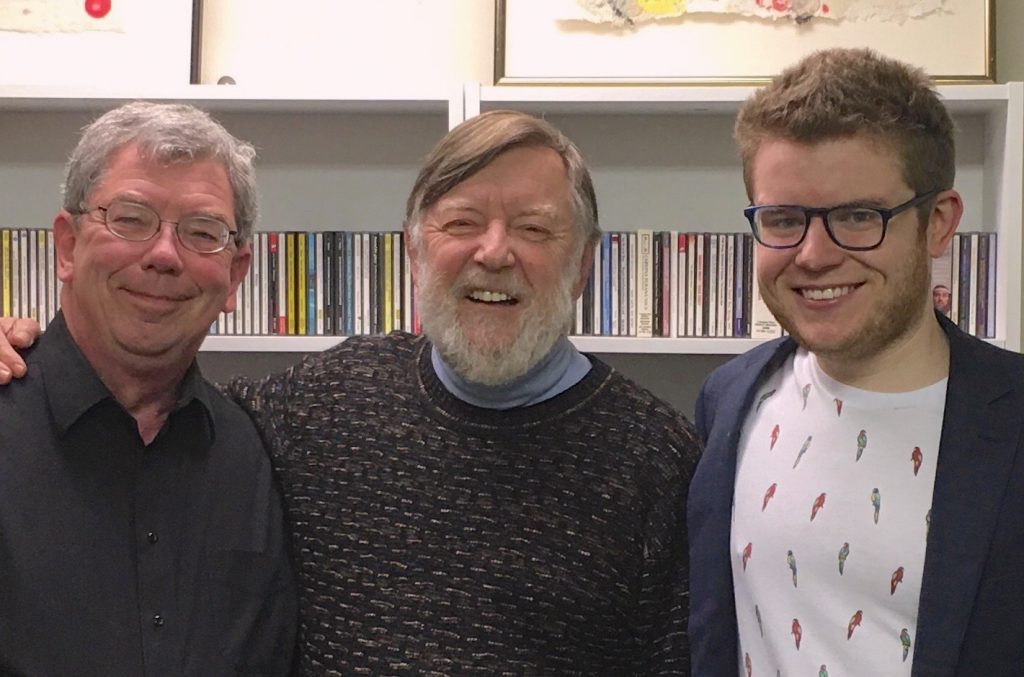
William Baker, Sir Andrew Davis, and Kansas City-based Ed Frazier Davis each conducted works in the Festival Singers’ tribute to Ed’s music. / Photo courtesy of the artists
William Baker Festival Singers: The Music of Ed Frazier Davis; One of Kansas City’s most prominent composers is also the Festival Singers’ composer-in-residence, and the choir dedicated an entire program to his music. Taking turns on the podium were William, Ed, and Ed’s famous father, Sir Andrew Davis, who conducted his son’s Seven Last Words from the Cross. The Singers were joined by the William Jewell College Concert Choir for this glorious setting, which demonstrated Ed’s growing command of texture, melodic design, and large-scale structure.
—By Paul Horsley
To reach Paul Horsley, performing arts editor; send an email to paul@kcindependent.com or find him on Facebook (paul.horsley.501) or Twitter (@phorsleycritic).